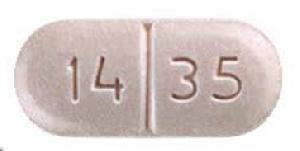Metaxalone Disease Interactions
There are 3 disease interactions with metaxalone.
Metaxalone (applies to metaxalone) anemia
Major Potential Hazard, Moderate plausibility.
The use of metaxalone is contraindicated in patients with or predisposed to drug-induced, hemolytic, or other anemias. Rare incidences of hemolytic anemia have been associated with the administration of metaxalone.
References
- "Product Information. Skelaxin (metaxalone)." Carnrick Laboratories Inc PROD (2001):
- "Product Information. Skelaxin (metaxalone)." King Pharmaceuticals, Inc. (2024):
Metaxalone (applies to metaxalone) renal/liver disease
Major Potential Hazard, High plausibility. Applicable conditions: Renal Dysfunction
The use of metaxalone is contraindicated in patients with severe hepatic and/or renal dysfunction. Metaxalone is metabolized by the liver and subsequently eliminated by the kidney, thus both parent drug and metabolites may accumulate in such patients. Therapy with metaxalone should be administered cautiously in patients with mild to moderate hepatic and/or renal impairment.
References
- "Product Information. Skelaxin (metaxalone)." Carnrick Laboratories Inc PROD (2001):
- "Product Information. Skelaxin (metaxalone)." King Pharmaceuticals, Inc. (2024):
Metaxalone (applies to metaxalone) alcohol
Moderate Potential Hazard, Moderate plausibility. Applicable conditions: Alcoholism
Metaxalone has central nervous system (CNS) depressant effects and should be used with caution with other CNS depressants including alcohol.
References
- "Product Information. Skelaxin (metaxalone)." King Pharmaceuticals, Inc. (2024):
Metaxalone drug interactions
There are 311 drug interactions with metaxalone.
Metaxalone alcohol/food interactions
There is 1 alcohol/food interaction with metaxalone.
More about metaxalone
- metaxalone consumer information
- Check interactions
- Compare alternatives
- Pricing & coupons
- Reviews (127)
- Drug images
- Side effects
- Dosage information
- Patient tips
- During pregnancy
- Drug class: skeletal muscle relaxants
- En español
Related treatment guides
Drug Interaction Classification
| Highly clinically significant. Avoid combinations; the risk of the interaction outweighs the benefit. | |
| Moderately clinically significant. Usually avoid combinations; use it only under special circumstances. | |
| Minimally clinically significant. Minimize risk; assess risk and consider an alternative drug, take steps to circumvent the interaction risk and/or institute a monitoring plan. | |
| No interaction information available. |
Further information
Always consult your healthcare provider to ensure the information displayed on this page applies to your personal circumstances.


